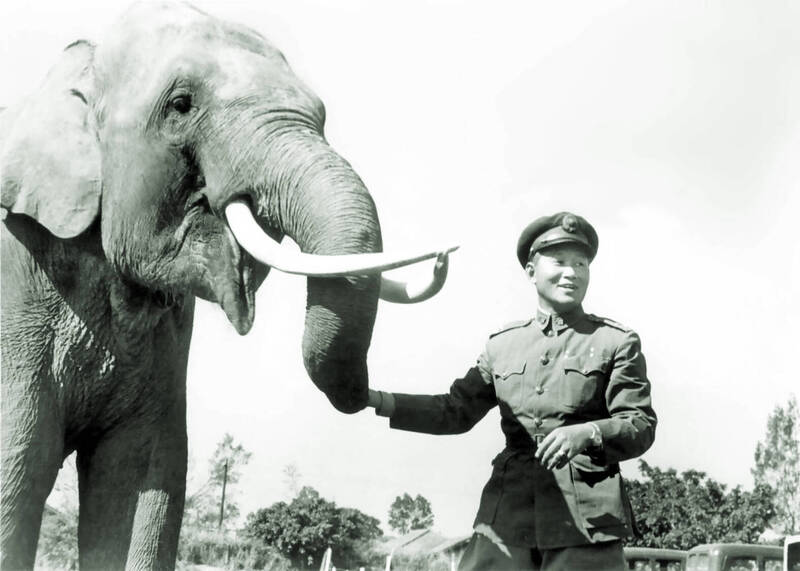《TAIPEI TIMES》Army celebrates memory of WWII elephant Lin Wang

General Sun Li-jen pets Lin Wang after the elephant was captured from the Japanese army during World War II. The male Asian elephant died at Taipei Zoo in 2003 at the age of 86. Photo courtesy of the Republic of China Army Command
By Wu Che-yu and Jonathan Chin / Staff reporter, with staff writer and CNA
The army yesterday celebrated the life of Lin Wang (林旺) the elephant, saying that the animal’s service made it a witness to the Whampoa Military Academy’s establishment in Taiwan.
Lin Wang was once a household name as the only creature of its kind in Taiwan following World War II, the Republic of China Army Command said in a news release.
The male Asian elephant died at Taipei Zoo in 2003 at the age of 86.
Affectionately referred to as “grandfather” by children, Lin Wang was remembered in songs such as a Cold War patriotic tune with lyrics including: “The hope of the world is raised straight and tall like the elephant’s trunk.”
Despite the superstardom of the animal, most Taiwanese are unaware of Lin Wang’s association with the army, especially the Whampoa Military Academy, the command said.
Lin Wang became part of army history as part of the Imperial Japanese Army, it said.
He was captured from the Japanese by Chinese Expeditionary Force personnel on the border with what is now Myanmar during the Burma Campaign in 1941.
In 1947, the commander of Chinese forces in Burma, general Sun Li-jen (孫立人), transported Lin Wang to Taiwan, housing the elephant at a training base named Officer Cadet Cohort 4 in what is now Kaohsiung’s Fengshan District (鳳山), it said.
The base later became the nucleus of the new Whampoa Military Academy, which was founded in Guangzhou, China, in 1924, it said.
Citing an interview with military academy graduate Tan Hsiung (譚熊), the command said that cadets and instructors, including Sun, adored the elephant, making him an unofficial mascot.
Long after graduating, officers would drop by the academy to visit and feed the elephant, a tradition that continued well after Lin Wang’s relocation to the zoo, Tan said in the interview.
The animal’s original handlers named him A-mei (阿美), but that was considered too effeminate and changed to the more martial-sounding Lin Wang (or “Forest King,” 林王), Tan said.
The final version of the elephant’s name resulted from a misunderstanding that replaced the character for “Wang” (王) with the homonym 旺, he said.
More than 500,000 men trained at Officer Cadet Cohort 4 in three years, including those who fought with distinction with the 201st Division of the Youth Army at the Battle of Guningtou in 1949, the command said.
A year after that, the Whampoa Military Academy was created from the Officer Cadet Cohort 4, it said.
Former engineering department chair Ku Yi-neng (顧以能), aged 89, said that the academy’s facilities were poor in its initial years, with untamed wilderness making up much of the nominal campus.
A major change came in 1955 when the academy reorganized itself around a four-year program in line with a new higher-education curriculum promulgated by the Ministry of Education, Ku said.
The revamp led to the construction of dormitories, schoolhouses and a library funded by private donations in place of the simple wartime barracks that dominated the landscape, he said.
“Today’s Whampoa Military Academy is awash with modern facilities and resources, and has come a long way from its humble origins,” the command said. “The academy continues to train an excellent cadre of officers who form the bedrock of our nation’s defense.”
“The stories of the Whampoa men are a microcosm of army history filled with struggles, hardships and sacrifices in defense of the nation’s existence and its future,” it said.
新聞來源:TAIPEI TIMES



















